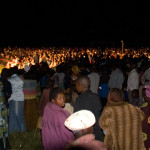Family planning vs. tradition in the DRC
By Tanya Castle
There are more than one billion people aged 15-24 throughout the world, with 87% living in developing countries and more than 200 million living on the African continent alone.
In many African countries, childbearing begins much earlier than in Western countries, with girls as young as 14 years old giving birth. With 200 million Africans of childbearing age, and an average fertility rate of 5.7, it is easy to do the math: Africa will soon experience dramatic population growth. In the Democratic Republic of Congo, the fertility rate is even higher than the rest of the continent, averaging 6.7. In anticipation of these population changes, there is a growing awareness of the need for modern family planning methods.
This sizable population increase will almost certainly impose enormous pressures on the state. As an already-fragile state, the DRC government is in a particularly precarious position in terms of its ability to provide adequate education, health care, and other essential services to its future citizens. From a resources perspective, population growth might also lead to environmental degradation and food insecurity, which may become sources of conflict.
Traditionally, Congolese culture favors large families for both social and economic reasons. Socially, having a large family is a signifier of wealth. Additionally, children play a part in defining gender roles: for men, fathering children indicates strength, endurance and virility; for women, bearing children represents femininity, fertility, and maternity. Especially for women, these qualities are viewed as highly desirable by Congolese society.
Religion also informs opinions on family planning in the DRC. Because most Congolese identify as Catholic, there is a strong conviction that the use of contraceptives to prevent pregnancy is morally wrong. In my own personal experience, I have met women who express the sincere belief that every child is a gift from God, and are therefore hesitant to interfere with what they see as His will.
From an economic perspective, the agrarian-dominated economy of the DRC necessitates large families: children are needed to help on the farm. Because of higher infant mortality rates in the past, parents also had to assume that not all of their children would survive into adulthood. Although these factors still influence decision-making today—particularly in more rural areas—fewer couples are making the choice to have larger families based solely on economic rationale. What, then, is keeping the fertility rate so high?
In many ways, Congolese couples continue to have large families because of deeply-rooted gender roles as well as patriarchal attitudes pervasive in the society. Often, this means that even if women would like to have fewer children, they do not have the agency to voice this opinion. Interestingly, these patriarchal attitudes have transcended the oft-typical generational divide to permeate current pop culture, as well: on radio stations across the country, musicians are heard singing, “You don’t eat the candy with the wrapper on,” a slang reference against condom use.
While there continue to be many obstacles to introducing modern family planning methods in the region, it is extremely important in terms of preventing future conflict for Congolese authorities to promote family planning. It is necessary to safeguard individual health and rights, preserve natural resources, and improve the economic stability of families, communities, and the nation as a whole.










Thanks for this article, pointing out the different motivations, influences and obstacles. I also see this as a very critical issue, which needs to be addressed. People need to reflect on it, in their given African context. Every country/ region has to see which approach would be the best to promote family planning methods … But at the end it remains an individual decision. Maybe with time, family planning will yield fruits and show the benefits … and therefore will be able to influence the decisions made by families/ fathers. At the end, every child is a blessing